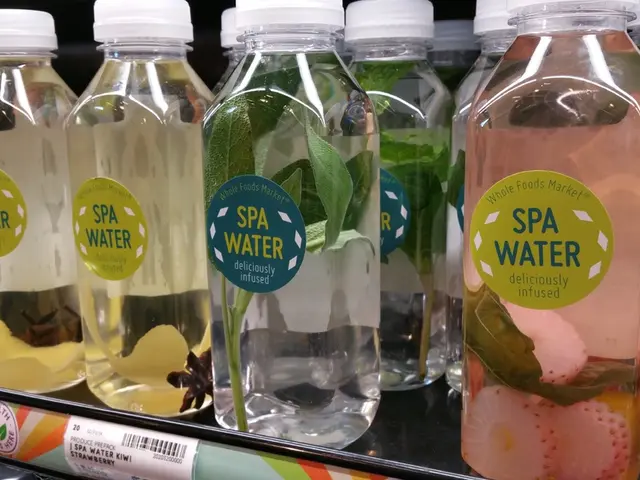Top 15 Superfoods Optimized for Optimal Nutrient Assimilation to Boost Health
Article Rewrite:
Craving optimal health? It's not just about chowing down on nutrient-rich grub; it's all about making sure your body can efficiently use those vitamins, minerals, and compounds. This biological process, known as nutrient absorption, is crucial for providing your body with energy, repair, and maintenance. However, factors such as crappy gut health or poor food combinations can hinder this process. Lucky for ya, some foods, known as "nutrient absorption superfoods," can boost this crucial biological function. Here's a tantalizing tour of 15 such marvels and how to bluff them into your diet for a nutrient-packed punch!
1. Spinach the Iron Goddess
Spinach is a nutrient-dense leafy green powerhouse, boasting loads of iron, magnesium, calcium, and vitamins A, C, and K – a veritable health buffet! The downside, though, is its high levels of oxalates which can interfere with the absorption of calcium and iron. But hey, don't sweat it! Pairing spinach with vitamin C-rich foods like citrus fruits, bell peppers, or tomatoes can turbocharge the absorption of its iron. Vitamin C transforms plant-based iron into a more absorbable form, ensuring your bod reaps the full spinach benefits!
Shoulder that spinach, and make it your bitch in various dishes: blend it into smoothies with OJ or berries, toss it into salads with citrus fruit slices, or cook it lightly in olive oil and garlic to preserve its nutrients! By coupling spinach with food pals, you reduce oxalate's impact and unlock spinach's full nutritional potential!
2. Avos attendance
Avocados, nature's butter, are a nutritious power-play to elevate nutrient absorption! They contain essential healthy monounsaturated fats which are vital for the absorption of fat-soluble vitamins A, D, E, and K. These vitamins are necessary for strong bones, healthy skin, and a strong immune system - so let's chow down! Avocados also provide fiber, potassium, and magnesium, promoting gut health and boosting overall nutrient metabolism.
Adding avocados to your meals is both delicious and versatile: mash them into guacamole, smear them on toast, or slice them into salads and grain bowls. Avos pair beautifully with nutrient-rich foods like tomatoes, leafy greens, and eggs, amplifying fat-soluble vitamins' absorption in every bite! Keeping avos on your menu guarantees your body extracts nutrients from every meal!
3. Sweet Potato Throne
Sweet potatoes are an irresistible root veggie brimming with beta-carotene, an antioxidant the body converts into vitamin A. Vitamin A is essential for maintaining healthy vision, immune function, and skin health – but it requires dietary fats to be absorbed efficiently. Synchronicity, pairing sweet potatoes with healthy fats like olive oil, avo, or a dollop of butter can supercharge beta-carotene's bioavailability!
Sweet potatoes are a versatile, easy-to-prepare option: roast 'em with a drizzle of olive oil and spices, mash 'em with a bit of butter or Greek yogurt for creaminess, or slice 'em into wedges for homemade baked fries. You can also blend 'em into soups or add 'em to smoothies for a nutrient boost. Combining sweet potatoes with a healthy fat source ensures maximal absorption of beta-carotene while tickling your taste buds!
4. Salmon Royalty
Salmon is a grand source of omega-3 fatty acids, healthy fats crucial for heart, brain, and skin health. Omega-3s also amplify the absorption of fat-soluble vitamins D and E, doubling salmon's nutritional powerhousing! Salmon is also laden with vitamin D, a nutrient that boosts calcium absorption crucial for strong bones and teeth. For those who may find sunlight exposure insufficient for their vitamin D intake, salmon offers a tasty, dietary alternative!
Incorporate salmon into your meals by grilling, baking, or steaming it and serving it with leafy greens or roasted veggies to create a nutrient-dense meal. Pairing salmon with calcium-rich foods, such as broccoli or kale, lets its vitamin D content amp up calcium absorption, ensuring your bod can efficiently use calcium!
5. Citrus Fruit Citadel
Citrus fruits like oranges, lemons, and grapefruits are refreshing powerhouses that kill it when it comes to enhancing nutrient absorption! They're packed with vitamin C, a nutrient central to improving the absorption of non-heme iron, the iron found in plant-based foods. Vitamin C teams up with iron by forming a compound that's easier for your bod to absorb. Beyond iron absorption, the antioxidants in citrus fruits protect cells from oxidative stress, promoting overall health!
Get citrusy by adding fresh lemon or lime juice to salads, roasted veggies, or marinades. Munch on oranges as a snack, or incorporate grapefruits into your breakfast. Citrus fruits also add pizzazz to smoothies or infused water, making iron absorption and antioxidant intake a delicious treat!
6. Fermented Friends
Fermented foods like yogurt, kefir, kimchi, sauerkraut, and miso are chock-full of probiotics, beneficial bacteria that support gut health! A healthy gut is vital for nutrient absorption because it ensures the digestive system breaks down food efficiently, allowing vitamins and minerals to be properly absorbed. Probiotics also boost the absorption of certain nutrients, like calcium, magnesium, and zinc, while reducing inflammation in the gut.
Welcome fermented foods into your diet by mixing yogurt or kefir into your breakfast. Dive into kimchi as a side dish, or use sauerkraut as a topping for sandwiches. Fermented foods can also be thrown into soups, grain bowls, or even smoothies for a unique taste twist. By indulging in fermented foods regularly, you'll improve gut bacteria diversity and enhance the bod's ability to extract goodness from everything you eat!
7. Eggcellent Ideas
Eggs are a nutrient-dense food offering a unique combo of vitamins, minerals, and healthy fats that promote nutrient absorption! The yolks are particularly rich in choline, an essential compound for brain health, as well as vitamin D, which boosts calcium absorption for strong bones. The fat content in eggs is ideal for the absorption of fat-soluble vitamins A, D, E, and K from other foods.
Chuck eggs into your diet by enjoying them boiled, scrambled, poached, or baked. Pair them with spinach, kale, or sweet potatoes to form nutrient-rich meals that maximize absorption. Furthermore, eggs complement grain bowls, salads, and breakfast wraps, making them a versatile food for any time of day!
8. Almond nuts
Almonds are an energy-dense snack with fine benefits for nutrient absorption! These nuts offer a fantastic source of vitamin E, a fat-soluble antioxidant that protects cells from oxidative damage. Vitamin E also works harmoniously with vitamin C to enhance its antioxidant effects, particularly helpful for skin and immune health. Almonds are also stuffed with healthy fats, essential for absorbing fat-soluble vitamins A, D, E, and K from other foods. Additionally, almonds provide magnesium, a vital mineral for calcium absorption and supporting muscle and nerve function.
Incorporate almonds into your diet as a convenient snack or smartly in your meals: sprinkle sliced almonds over oatmeal, yogurt, or salads for added crunch and nutrition. Or transform them into almond butter to smear on whole-grain bread. Savour almonds raw, roasted, or as a topping, and watch your nutrient intake and absorption skyrocket!
9. Garlicky Glee
Garlic is more than a flavorful addition to your meals; it's an incredible nutrient absorption enhancer! Garlic contains sulfur compounds such as allicin which boost the body's ability to absorb minerals like zinc and iron. Zinc plays a key role in supporting the immune system, wound healing, and hormone regulation, while iron is essential for oxygen transport and energy production! Garlic's gut-supporting properties also make it your gut's sidekick, ensuring that digested nutrients reach your bod with maximum efficiency.
Level up garlic's health benefits by crushing or chopping fresh garlic, then letting it sit for a few minutes before cooking. This process activates allicin, elevating its potency. Flavour your dishes with garlic: add it to soups, stews, roasted veggies, or stir-fries. Team up garlic with vitamin C-rich foods, like tomatoes, bell peppers, or citrus, for a double whammy iron absorption punch!
10. Oily Love
Olive oil is a staple of the Mediterranean diet and an exceptional fat for enhancing nutrient absorption. Rich in monounsaturated fats, olive oil is a Godsend for the absorption of fat-soluble vitamins A, D, E, and K. It also provides polyphenols, antioxidants that safeguard gut health by reducing inflammation and protecting the digestive tract lining. A healthy gut is key to efficient nutrient uptake, making olive oil a stellar choice for your bod's overall health!
Embrace olive oil by using extra virgin olive oil as a dressing for salads, drizzling it over roasted veggies, or mixing it into grain bowls. You can also use it for light sautéing or as a base for marinades and homemade dips. By coupling olive oil with nutrient-rich foods like leafy greens or tomatoes, you amplify the vitamins and antioxidants' absorption, ensuring your bod gets the most out of every meal!
11. Broccoli Sovereignty
Broccoli is a nutritional powerhouse boasting vitamin C, fiber, and sulforaphane, all contributing to liver detoxification and nutrient metabolism. Vitamin C in broccoli enhances the absorption of non-heme iron from plant-based sources, making it valuable for vegetarians and vegans. Sulforaphane, on the other hand, helps your bod eliminate toxins and boosts the bioavailability of other nutrients, championing your overall health!
Steam or roast broccoli to preserve its nutrients and team it up with foods high in iron, like lentils or quinoa, for a synergistic nutrient-boosting party! Toss broccoli into stir-fries, soups, or pasta dishes, or enjoy it raw with dip for a crunchy, refreshing snack. Broccoli's flexibility and nutrient density make it a must-have superfood for maximizing nutrient absorption!
12. Pepper's Prime
Black pepper is a humble kitchen staple with extraordinary power – it elevates nutrient absorption! It contains piperine, a compound that increases the bioavailability of curcumin in turmeric by up to 2000%, amplifying its anti-inflammatory effects. Get the most out of your turmeric by sprinkling black pepper liberally over dishes, particularly dishes containing turmeric – like curries, soups, or golden milk lattes. Pairing pepper with turmeric boosts curcumin absorption, unleashing its full potential and aiding in bodily healing!
13. Berrylicious
Berries, like strawberries, blueberries, raspberries, and blackberries, are not only delicious but also packed with antioxidants, fiber, and vitamin C! Their high vitamin C content extends a helping hand in the absorption of non-heme iron from plant-based foods. The antioxidants in berries, such as anthocyanins, protect cells from oxidative stress while promoting skin and immune health.
Indulge in berries by mixing them into oatmeal, yogurt, or smoothies, or enjoy them raw as a tangy-sweet snack. Use them as a natural sweetener in salads or desserts or constitute a delightful, nutrient-packed snack. Berries' vibrant colours and flavours make them a versatile and health-enhancing food!
14. Whole Grain Victory
Whole grains like quinoa, brown rice, and oats are chock-full of fiber, B vitamins, and magnesium, supporting energy production, gut health, and nutrient metabolism. Fiber in whole grains feeds friendly gut bacteria, fostering a healthy gut environment that augments nutrient absorption. Magnesium, a mineral found in whole grains, assists in the absorption of calcium and vitamin D, ensuring your bones stay sturdy and healthy!
Add whole grains to your meals as a grain bowl base, mix them into soups, or serve them alongside roasted veggies and lean proteins. Team up whole grains with vitamin C-rich foods, like bell peppers or citrus, to further enhance iron absorption and make your meals even more nutritious!
15. Turmeric Triumph
Turmeric, solidified in golden spice fame, is a powerhouse thanks to its active compound curcumin, boasting potent anti-inflammatory and antioxidant properties. Curcumin, however, isn't easily absorbed by the body on its own. Pair turmeric with black pepper or healthy fats, like olive oil or coconut oil, to enhance its bioavailability significantly, ensuring your body gets the maximum benefits of this golden gem!
Invite turmeric to your dishes by adding it to curries, soups, or rice dishes. Or stir it into golden milk lattes and smoothies for a flavourful health boost. Season your roasted veggies or fish or chicken with turmeric, and enjoy the synergy of black pepper and fats for heightened nutrient absorption!
Conclusion
Optimizing nutrient absorption can transform your diet into a strategic tool unleashing the full potential of the foods you eat! By incorporating these 15 nutrient absorption superfoods into your diet, you enhance your bod's ability to utilize essential vitamins, minerals, and antioxidants, promoting better energy levels, an enhanced immune system, and overall health. Pair these foods wisely, like coupling vitamin C-rich citrus with iron-rich spinach, or teaming turmeric with black pepper or healthy fats, to maximize nutrient absorption. With a mindful approach to your meals, you'll transform your body from within, thriving healthily!
- Black tea promises Black tea is a common beverage that aids in the absorption of iron. Its tannins form complexes with iron, delaying its absorption and providing a more efficient release.
- Quinoa's royalty Quinoa is a complete protein that also promotes nutrient absorption. It contains phytic acid, which can interfere with mineral absorption; however, cooked quinoa is low in phytic acid, making it a suitable source for minerals like magnesium, zinc, and iron.
- Ginger's glories Ginger enhances the absorption of various nutrients. Its active compounds gingerols and shogaols improve digestion, alleviate indigestion, and boost nutrient absorption, especially for fatty acids and vitamins A, D, and E.
- Seafood's role in health Seafood, particularly shellfish, is a good source of zinc, a mineral crucial for immune function and enzyme production. Zinc also supports the absorption of other essential minerals, such as calcium, iron, and copper.
- Probiotic-rich yogurt Regular yogurt consumption helps promote nutrient absorption by bolstering gut health. Healthy gut bacteria aid in the breakdown of food, enabling better absorption of nutrients like calcium and magnesium.
- Apple cider vinegar aid Apple cider vinegar contains acetic acid, which can aid in the absorption of minerals like calcium and potassium. Consuming it diluted before meals can help enhance mineral absorption.
- Adrenal fatigue solutions To prevent adrenal fatigue, balance stress, and maintain overall wellness, cultivate good sleep hygiene, maintain proper nutrition, engage in stress-reducing activities like meditation, and seek support through therapies and treatments if needed.
- Bone broth bone-y benefits Bone broth is rich in minerals like calcium, magnesium, phosphorus, and silicon, which aid in bone health. Collagen in bone broth may also benefit joint health and connective tissue repair.
- Ashwagandha essence Ashwagandha is an adaptogenic herb that can support thyroid function, reduce stress and anxiety, and boost energy levels. It is often used as a complementary aid for autoimmune disorders, chronic diseases, and mental health issues.
- Calcium-fortified foods Incorporating calcium-fortified foods like orange juice, soy milk, and tofu may help supplement dietary calcium intake, ensuring adequate calcium absorption for bone health.
- Gluten-free options For individuals with celiac disease or gluten sensitivity, eliminating gluten from the diet can alleviate digestive issues and promote the absorption of nutrients. Focus on nutrient-dense, gluten-free options like quinoa, brown rice, and fruits and veggies.
- Vitamin D deficiency prevention In addition to sun exposure, vitamin D can be sourced through dietary means, such as fatty fish, fortified milk and cereals, and mushrooms exposed to sunlight. Adequate vitamin D levels are essential for absorbing minerals like calcium and phosphorus.
- Magnesium supplementation Magnesium deficiency can lead to various health issues. Supplementation may be necessary for some individuals, and it can promote better nutrient absorption, especially in conjunction with calcium.
- Climate change countermeasures Address climate change by supporting renewable energy sources like solar and wind, adopting green transportation methods, and prioritizing environmental science in research and policy-making. Additionally, reduce personal carbon footprint by conserving energy and making sustainable choices in retail, consumption, and lifestyle.
- Small-scale agriculture Support small-scale, sustainable farming practices to promote local food systems, economic diversity, and environmentally friendly farming methods. This can minimize the impact of manufacturing and transportation on our planet and ensure the quality and health of food produced.








